
Latest News Regarding
Horn of Africa
UN Security Council urges end to Somalia political crisis
UN Security Council urges end to Somalia political crisis



AFP
source: AFP, Saturday April 24, 2021
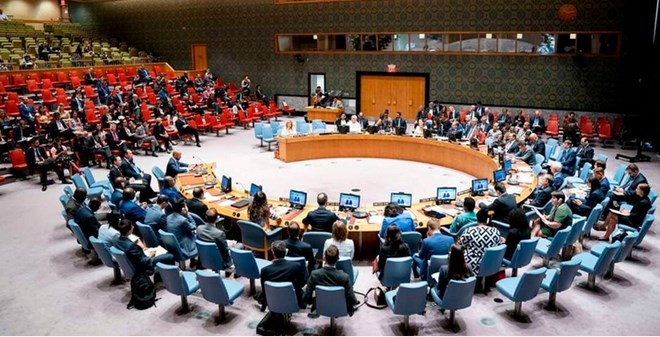
The UN Security Council adopted a statement Friday calling on parties in Somalia “to reject violence and resume dialogue as a matter of urgency and without precondition,” underscoring its concern over the country’s political crisis.
“The members of the Security Council expressed their deep concern about the continued political impasse and disagreement among Somalia’s political leaders on the model for elections,” the document said.
Ads By GoogleThe Security Council on March 31, following an urgent meeting, had called on Somali authorities to resolve the dispute over the electoral process.
The legal authority of President Mohamed Abdullahi Mohamed, better known as Farmaajo, has been in doubt since February when his four-year term expired before fresh presidential elections were held.
A bill earlier this month extending his mandate by two years bypassed the Senate after being adopted by the lower house of parliament.
Opposition parties decried the move as an unconstitutional bid to cling to power, and the law was criticized by the international community.
The president and leaders of Somalia’s five semi-autonomous federal states had reached an agreement in September that paved the way for indirect parliamentary and presidential elections in late 2020 and early 2021.
But it fell apart as squabbles erupted over how to conduct the vote, and multiple rounds of talks have failed to break the impasse.
The new law paves the way for a one-person, one-vote election in 2023 — the first such direct poll since 1969 — which Somalis have been promised for years and no government has managed to deliver.
The Security Council statement added that the political impasse is also “diverting attention from pressing problems such as floods, drought, desert locusts, the COVID-19 pandemic, and combatting the terrorist threat of Al-Shabaab.”
Conflict in South Sudan’s Equatoria Region
Conflict in South Sudan’s Equatoria Region
Source: The US Institute of Peace published in April 2021 a study titled “Conflict and Crisis in South Sudan’s Equatoria” by Alan Boswell, International Crisis Group.
The report examines the conflict in Equatoria region of South Sudan. It concludes the crisis in Equatoria will likely become entrenched if peace talks do not gain momentum and as resentments from abusive counterinsurgency campaigns mount and disillusionment with the troubled peace process grows. 0 commentsLabels: Dinka, Equatoria, IGAD, Riek Machar, Salva Kiir, South Sudan, SPLA, SPLM/A-IO, Thomas Cirillo, Uganda, Yoweri Museveni
AFRICOM General: Illegal extension biggest threat to Somali security; not Al-Shabaab
AFRICOM General: Illegal extension biggest threat to Somali security; not Al-Shabaab




Source: Hiiraan Online, Friday April 23, 2021
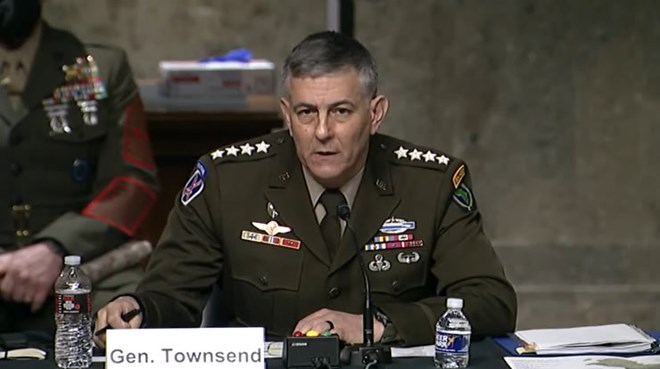
Mogadishu (HOL) – The Commander of the United States Africa Command (AFRICOM) told a Senate panel that the illegal term extension posed the biggest obstacle to security in Somalia and not the militant insurgent group Al-Shabaab.
Townsend, a four-star Army general, appeared before the Committee on Armed Services and testified that the political dysfunction between federal and regional governments is the most pressing security challenge in the country.Ads By Google“The biggest impact to security in Somalia right now is less Al-Shabaab and moreso the political dysfunction that exists between the federal government of Somalia and the federal member states. As you mentioned in your opening remarks, the extra-constitutional extension of the president’s term in office — that’s our biggest challenge, I think, right now.”
Gen. Townsend said that the Trump-ordered withdrawal of US troops from Somalia has seriously affected its ability to conduct counterterrorism operations.
“There’s no denying that the repositioning of forces out of Somalia has introduced new layers of complexity and risk,” Townsend told Senator Jack Reed. “Our understanding of what’s happening in Somalia is less now than it was when we were there on the ground physically located with our partners.”
The General said that US troops often fly in from either Djibouti or Kenya.
“We have been commuting to work. We work virtually with our partners from our bases in the region, and then we fly in to conduct training and to advise and assist our partners.”
The African Union held a Peace and Security Council (PSC) on Thursday. It condemned a resolution passed by Somalia’s Lower House of Parliament on April 12 to extend the federal government’s mandate. The PSC said the extension would roll back hard-won gains in Somalia’s nascent democracy and constitutional process.
Security Council members hold off-the record meeting on Somalia
Security Council members hold off-the record meeting on Somalia




Source: Hiiraan, Wednesday April 21, 2021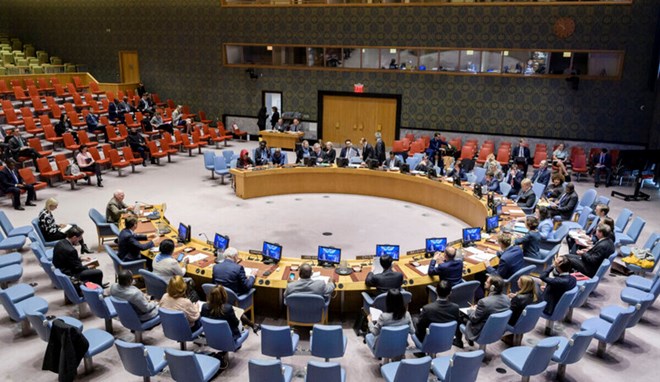
Mogadishu (HOL) – Members of the UN Security Council urged Somalia’s leaders to return to the negotiating table based on the September 17 agreement on Tuesday during an off-the-record conversation known as an informal interactive dialogue (IID).
After the meeting, several participants released brief statements based on their discussion.”The only viable option for Somalia is a resumption of dialogue based on the September 17 agreement,” said the Norwegian Mission to the UN.
Ireland, one of the 15 members of the Security Council, said that they welcomed the leadership role of the African Union in facilitating dialogue. They also said they would support processes from multinational unions such as the IGAD, AU and the EU.
T. S. Tirumurti, India’s Ambassador to the UN, said that he also called on the federal government and regional member states to resume dialogue based on the September 17 agreement and the recommendations from the Baidoa Technical Committee. Tirumurti also welcomed the leadership role of the African Union and IGAD.
An IID is an informal private meeting of Security Council members convened to hold situation-specific, off-the-record conversations with non-Council member states. The dialogue is presided over by the Council President, in this case, Ambassador Dang Dinh Quy, the Permanent Representative of Viet Nam to the UN. Records are not kept during informal interactive dialogues, and they are not open to the public or broadcast.
Tuesday marked the second time this year that the Security Council held an IID focused on Somalia. They last held an IID on Somalia on 20 January to discuss delays in holding presidential and parliamentary elections.
Due to the format of the IID, the Council did not issue a press statement. However, based on the comments from the Council members, it is evident that the African Union and IGAD are expected to take some form of a leadership role in facilitating talks between the federal government and regional member states. It is unclear if either organization will be involved in direct external mediation, which the federal government has long resisted.
Farmajo travelled to the capital of the DRC over the weekend, where he requested the African Union to facilitate talks with political opponents and various stakeholders. He made the comments during a one-day visit with the President of the Democratic Republic of Congo (DRC), Felix Tshisekedi, who is also the 2021 African Union Chairperson.
The UN meeting comes amid heightened political tension in the country after the President decided to extend its mandate for an additional two years. Farmajo said that the federal government would use the two years to prepare for popular elections.
The UN had previously warned against any parallel process or partial elections, insisting that the September 17 agreement in Mogadishu remains the only valid process.
Averting Political Violence in Somalia
Averting Political Violence in Somalia
Source: The International Crisis Group (ICG) published on 16 April 2021 a brief titled “Somalia: Averting a Descent into Political Violence.”
Tension has increased in Somalia following parliament’s decision to extend the incumbent president’s term by two years. The ICG urges external partners led by the African Union to mediate talks among Somalia’s bitterly divided political elites. 0 commentsLabels: al-Shabaab, AU, elections, EU, IGAD, Jubaland, Mohamed Abdullahi Farmajo, Puntland, Somalia, UNSC, US
Conflict in South Sudan’s Equatoria Region
Conflict in South Sudan’s Equatoria Region
Source: The US Institute of Peace published in April 2021 a study titled “Conflict and Crisis in South Sudan’s Equatoria” by Alan Boswell, International Crisis Group.
The report examines the conflict in Equatoria region of South Sudan. It concludes the crisis in Equatoria will likely become entrenched if peace talks do not gain momentum and as resentments from abusive counterinsurgency campaigns mount and disillusionment with the troubled peace process grows. 0 commentsLabels: Dinka, Equatoria, IGAD, Riek Machar, Salva Kiir, South Sudan, SPLA, SPLM/A-IO, Thomas Cirillo, Uganda, Yoweri Museveni
Eritrea Acknowledges It Has Troops in Ethiopia
Eritrea Acknowledges It Has Troops in Ethiopia
Source: Reuters published on 16 April 2021 an article titled “Eritrea Admits Presence in Ethiopia’s Tigray, Tells U.N. Withdrawing” by Michelle Nichols.
Eritrea admitted on 16 April for the first time since early last November that it has Eritrean Defense Force personnel in Tigray Region and that it has agreed to “start” withdrawing its troops from Ethiopia. 0 commentsLabels: Abiy Ahmed, ENDF, Eritrea, Eritrean Defense Forces, Ethiopia, Tigray Region, UNSC
Professor Mohamed Abdi Gandi

Somali International Rehabilitation Centre (SIRC) extends its condolence to the family, relatives and to Somali people for sudden death of Profession Mohamed Abdi Gandi who was geologist, anthropologist, historian and contributed a lot to International Horn of Africa Peace Conferences (2002 -2012) Lund, Sweden.
Farmajo: African Solutions to African Problems
Farmajo: African Solutions to African Problems




Source: Hiiraan Online, Tuesday April 20, 2021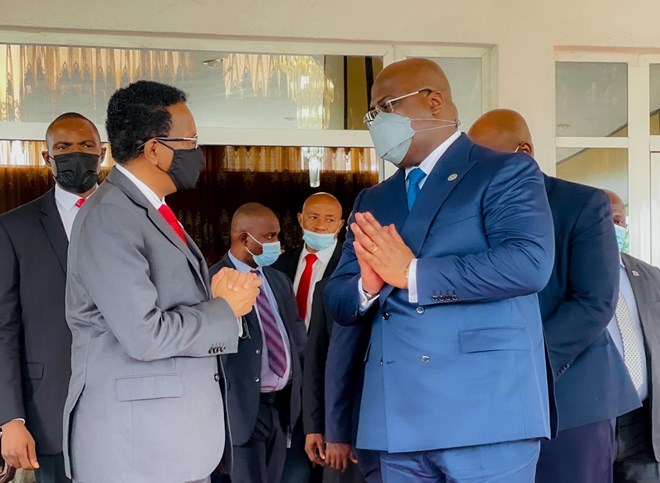
Mogadishu (HOL) – Somalia’s President has asked the African Union to facilitate talks with political stakeholders.
The announcement came on Sunday from the Ministry of Foreign Affairs and the President of the Democratic Republic of Congo. They emphasized that it would be a Somali-led and owned process.”With regards to # Somalia’s efforts to hold peaceful, inclusive, and timely elections, (Farmaajo’s) government would welcome the role of the AU in facilitating a Somali-led and Somali-owned engagement process that would lead to dialogue,” The Ministry said on Twitter.
Farmajo travelled to the capital of the Democratic Republic of Congo late Saturday evening for a one-day meeting with President Felix Tshisekedi, who is also the 2021 African Union Chairperson.
Mohamed Abdirizak, Somalia’s Minister of Foreign Affairs, travelled with Farmajo to Kinshasa for the meeting and said that Farmajo advocated for “African solutions to African problems.”
“Two presidents discussed bilateral issues as well as African issues, continental issues. In their discussions, President Farmajo talked about the need to encourage African Solutions to African Problems, and as such, indicated his government’s willingness to see the AU take a leadership role in the facilitation of an engagement process that would lead to dialogue amongst Somali stakeholders.”
The Minister emphasized that it would be a “Somali-led and Somali-owned” dialogue.
He said that President Tshisekedi was onboard with Farmajo’s suggestion of African solutions and talked about the need for continuity and political stability in Somalia.
“On his part, President Tshisekedi has talked about the need for continuity, political stability and development and has agreed with the notion of African Solutions to African problems.”
President Tshisekedi said that he welcomed the initiative proposed by Farmajo.
“Advocating African solutions to African problems, the Head of State welcomed President Mohamed Abdullahi Mohamed’s approach to open up to the AU and to reach out to all Somali stakeholders for a just and lasting peace.”
On April 12, Somalia’s Lower House – or House of the People – voted to extend the federal government’s mandate for two years in a hurried session that barred political opponents from participating. Almost immediately, the legislation was rejected by Somalia’s Upper House and a coalition of opposition leaders, but it was signed into law by President Farmajo nonetheless.
The extension came after weeks of talks between the federal government and regional states on the implementation of the September 17 agreement collapsed. The federal government blamed Puntland and Jubaland for the breakdown in negotiations and said they insisted on meeting with preconditions. Puntland and Jubaland denied that they were the saboteurs and insisted that Farmajo adjourned the meeting without their consultation and that he was politically maneuvering for an extension.
Somalia’s international partners have firmly stated that they would only support the September 17 agreement and heavily criticized Farmajo’s move to extend his mandate. Both the US and the EU said they would consider reassessing their bilateral relationship and placing individuals on sanctions. Somalia accused the international community of leveraging aid as blackmail.
President Farmajo’s trip to Kinshasa is the first since the controversial term extension and could potentially be viewed as a sign to his opponents that he is still recognized as President despite their protest.
Furthermore, Farmajo’s advocacy of African Solutions may be an acknowledgement of his growing rift from traditional Western backers. Before he took off for Kinshasa, Farmajo met with top-level international diplomats that included Ambassadors from the EU, AU, UK and US.
Somalia’s international partners have played a key role in facilitating previous negotiations between the federal government and the regional states, but the federal government insisted that it could settle the electoral crisis through Somali-led talks and firmly rejected direct external mediation.
Sources previously reported that the two leaders would discuss Somali-Kenya relations, and although the exact details are unknown, the Foreign Minister confirmed that ‘continental issues’ were discussed. Relations between the two East African neighbours have been fraught but crescendoed last month during an International Court of Justice hearing on a maritime dispute. It is unclear if Farmajo’s discussed his new ‘African solutions’ policy in this context.
President Farmajo’s trip to Kinshasa may strike many as odd, seeing as Somalia has almost no economic, political or cultural exchange with the DRC, but President Tshisekedi was elected the 2021 African Union Chairperson, and he met with Farmajo in this capacity. The African Union operates the AMISOM peacekeeping mission in Somalia and includes 20,000 soldiers. The drawdown was supposed to happen this year, but it has been pushed back to 2023.
Djibouti’s President Re-elected with 98.58 Percent of Vote
Djibouti’s President Re-elected with 98.58 Percent of Vote
Source: Agence France-Presse published on 10 April 2021 an article titled “Veteran Ruler Guelleh Re-elected Djibouti Leader for Fifth Term.”
Djibouti re-elected Ismail Omar Guelleh for a fifth term with 98.58 percent of the vote against a little known businessman. The voting went smoothly. Djibouti’s main opposition parties boycotted the election.0 commentsLabels: Djibouti, elections, Ismail Omar Guelleh, political parties
Somali president signs law extending mandate for two years
Somali president signs law extending mandate for two years




Source: AFP, Wednesday April 14, 2021
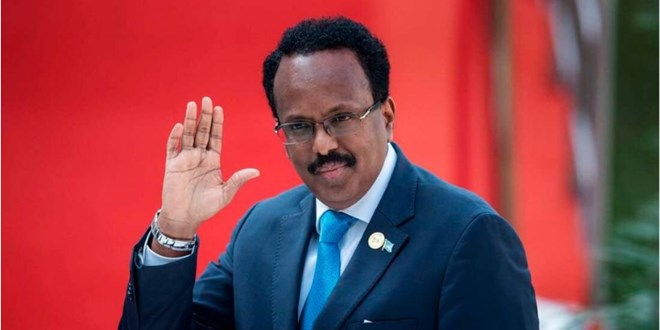
Somalia’s President Mohamed Abdullahi Mohamed has signed a controversial law extending his mandate for another two years, despite threats of sanctions from the international community.
State broadcaster Radio Mogadishu said the president, better known by his nickname Farmajo, had “signed into law the special resolution guiding the elections of the country after it was unanimously passed by parliament”.Somalia’s lower house of parliament on Monday voted to extend the president’s mandate after months of deadlock over the holding of elections in the fragile nation.
However the speaker of the Senate slammed the move as unconstitutional, and the resolution was not put before the upper house, which would normally be required, before being signed into law.
Farmajo and the leaders of Somalia’s five semi-autonomous federal states had reached an agreement in September that paved the way for indirect parliamentary and presidential elections in late 2020 and early 2021.
But it fell apart as squabbles erupted over how to conduct the vote, and multiple rounds of talks have failed to break the impasse.
US, UK consider reassessing bilateral relations with Somalia after Federal Government term extensions
US, UK consider reassessing bilateral relations with Somalia after Federal Government term extensions




Source: Hiiraan online, Wednesday April 14, 2021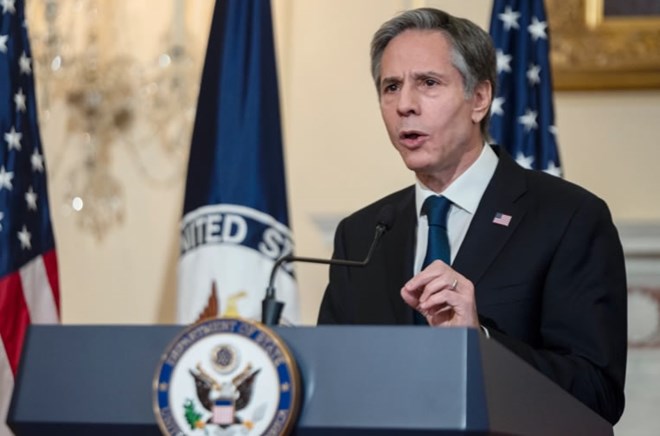
Secretary of State Antony Blinken’s comments comes after President Farmajo formally signed into law a directive that would extend the federal government’s mandate for two years [File: Andrew Caballero-Reynolds/Pool via AP]
Mogadishu (HOL) – The United States and the United Kingdom governments have voiced their opposition to the extension of Somalia’s presidential and parliamentary terms by two years. President Farmajo formally signed the legislation on Tuesday despite objection from Somalia’s Upper House of Parliament.
Antony Blinken, the US Secretary of State, said on Tuesday that his government was ‘deeply disappointed’ by the decision to extend the mandate without support from stakeholders.”We have stressed repeatedly that it is vital for the peace, stability, prosperity, and governance of Somalia that the Federal Government and the Federal Member States reach a consensus on a way forward for the electoral process. We have also made clear that the United States does not support mandate extensions without broad support from Somalia’s political stakeholders, nor does the United States support parallel or partial electoral processes.”
The statement went on to say that the action would undermine the partnership with the international community.
“Such actions would be deeply divisive, undermine the federalism process and political reforms that have been at the heart of the country’s progress and partnership with the international community, and divert attention away from countering al-Shabaab. They will also further delay holding the promised elections awaited by the Somali people.”
James Duddridge, The British is the Minister for Africa at the Foreign, Commonwealth & Development Office (FCDO), said that the United Kingdom was “dismayed” and warned that a unilateral extension was not conducive to Somalia’s peace and security.
“We are dismayed by the decision of the Lower House of the Somali Parliament to extend the mandates of Mohamed Farmajo as President and of the Somali Parliament by two years. This is not a solution to the ongoing impasse on the electoral process, but instead a move that undermines the credibility of Somalia’s leadership and risks the safety and future of the Somali people.”
On Monday, 149 MPs in Somalia’s 275-member Lower House of Parliament voted to extend their terms and the mandate for the embattled President Farmajo for two years. The law also directed the nation’s electoral committee to oversee popular elections. Fifteen lawmakers who previously opposed term extensions were barred from Parliament.
The parliamentary term expired on December 27, 2020, while the President’s term ended on February 8, 2021.
The decision was quickly met with opposition from Somalia’s Upper House, who outright rejected the bill.
Farmajo formally signed the new directive into law on Tuesday afternoon.
Both the UK and the US said they would reassess their bilateral relationship with Somalia.
Blinken said that the US would consider sanctions and visa restrictions on individuals.
“Implementation of this bill will pose serious obstacles to dialogue and further undermine peace and security in Somalia. It will compel the United States to reevaluate our bilateral relations with the Federal Government of Somalia, to include diplomatic engagement and assistance, and to consider all available tools, including sanctions and visa restrictions, to respond to efforts to undermine peace and stability.”
Duddridge echoed that sentiment and said Somalia’s relationship with the broader international community would change.
“In the absence of consensus leading to inclusive and credible elections being held without further delay, the international community’s relationship with Somalia’s leadership will change. The UK will work with its international partners on a common approach to reevaluate our relationship and the nature of our assistance to Somalia.”
Both the US and UK urged restraint from Somalia’s government and political stakeholders and urged a return to talks between the federal and regional states.
Earlier on Tuesday, the European Union called the extension “a grave threat” to the region’s peace and security.
“The European Union believes that the passage and signing of this resolution will divide Somalia, impose additional delays and constitute a grave threat to the peace and stability of Somalia and its neighbours,” Borrell said in a statement.”
The Chairman of the US House Foreign Affairs Committee, Michael McCaul and Congressman Gregory Meeks from New York have advocated that the US government place sanctions against those who “impede the democratic process.”
Cold War Brewing on the Blue Nile?
Cold War Brewing on the Blue Nile?
Source:Bloomberg published on 8 April 2021 an article titled “A Cold War Is Brewing on the Blue Nile” by Amr Adly.
The author argues that in the absence of an agreement on water release from the reservoir behind the Grand Ethiopian Renaissance Dam, the Blue Nile could become the theater of a riparian Cold War, with the possibility of confrontation involving Ethiopia, Egypt, and Sudan. 0 commentsLabels: border conflict, Cold War, Egypt, Ethiopia, GERD, Nile waters, Sudan, Tigray Region
Nile Water Talks in Kinshasa End Without Agreement
Nile Water Talks in Kinshasa End Without Agreement
Reuters published on 6 April 2021 an article titled “Three-way Talks over Ethiopian Dam Fail in Kinshasa–Statements.”
The three day meeting in Kinshasa of the foreign ministers of Ethiopia, Egypt, and Sudan ended without any agreement on moving forward with the filling of the reservoir behind the Grand Ethiopian Renaissance Dam on the Blue Nile. It is not clear what happens next.0 commentsLabels: AU, Blue Nile, Egypt, Ethiopia, EU, GERD, mediation, Nile waters, Sudan, UN, US
Lile Water Talks in Kinshasa End Without Agreement
ile Water Talks in Kinshasa End Without Agreement
Source: Reuters published on 6 April 2021 an article titled “Three-way Talks over Ethiopian Dam Fail in Kinshasa–Statements.”
The three day meeting in Kinshasa of the foreign ministers of Ethiopia, Egypt, and Sudan ended without any agreement on moving forward with the filling of the reservoir behind the Grand Ethiopian Renaissance Dam on the Blue Nile. It is not clear what happens next.0 commentsLabels: AU, Blue Nile, Egypt, Ethiopia, EU, GERD, mediation, Nile waters, Sudan, UN, US
Somaliland: The Horn of Africa’s New Wild Card
Somaliland: The Horn of Africa’s New Wild Card




Source: International Policy Digest, Thursday April 8, 2021
By Cok Corrado
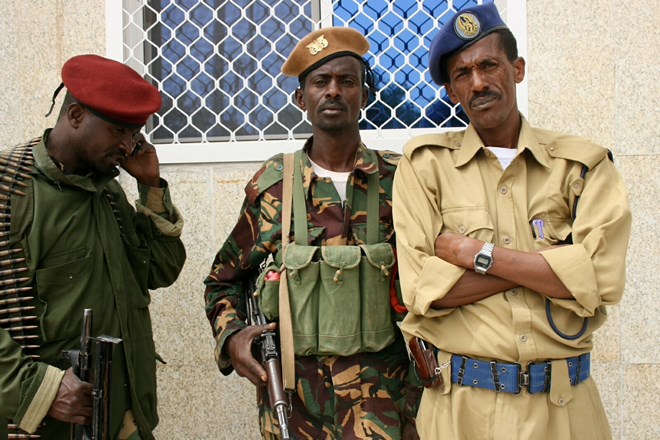
Guards remain vigilant at the 2010 Somaliland presidential inauguration./Teresa Krug
A new actor is jostling in the Horn of Africa. Somaliland, a self-declared breakaway republic of northern Somalia, scaled up its foreign policy in 2020 following years of lobbying for international recognition. Emboldened by its geopolitical centrality, leaders of Somaliland embraced a new quest for regional and international allies last year. Nevertheless, President Muse Bihi Abdi’s new strategy is set to build new ties while also breaking others. The ultimate result of this brinkmanship diplomacy remains to be seen.
The Republic of Somaliland separated from Somalia in 1991. Its ten-year conflict against Mogadishu had reached appalling levels of violence, such as the bombing of Hargeisa in May 1988. Therefore, when Somalia plunged into anarchy, Somaliland leaders carved out their enclave in northern Somalia and continued to enforce their autonomous rule in open defiance to Mogadishu. The latest round of talks between Mogadishu and Hargeisa took place last summer in Djibouti, but it quickly went awry. Somaliland’s foreign policy indirectly contributed to that outcome. Now, the Somali constitutional crisis further rules out an agreement between the two parties.
From Geo-economics to Geopolitics
Somaliland is a net beneficiary from power competition in the Red Sea and the Gulf of Aden. As regional powers grew interested in this strategic waterway, ports became economic and security pivots. In parallel to its effort in Yemen, the United Arab Emirates (UAE) crossed the Gulf of Aden and landed in the historic port city of Berbera. Despite the ban from the Somali federal government, the Dubai-controlled DP World signed a 30-year concession with Somaliland authorities to develop and manage the port. In March 2021, Abu Dhabi appointed a career diplomat to its trade office in Hargeisa, which signaled its desire to maintain strong ties with the local authorities.
In March, DP World delivered three gantry cranes to Berbera as part of its programme to bring the port’s capacity to 500,000 TEU (Twenty-Foot Equivalent Unit), hence overtaking Djibouti’s container terminal with its 350,000-TEU capacity. So far, Djibouti maintains the upper hand due to its superior infrastructures serving the port—specifically, the Djibouti-Addis Ababa railway, its developed free trade zone, and the Chinese-built Doraleh Multipurpose Port, which opened in 2017. However, the Berbera port will enhance its competitiveness after completing the free trade zone by the Emirati company and the carriageway connecting Berbera to the Ethiopian border in 2022.
Landlocked Ethiopia is pivotal for Djibouti and Somaliland. Addis Ababa depends on the tiny outlet of Djibouti for 90 percent of its maritime imports. Therefore, it decided to diversify its commercial routes by investing in the port of Berbera. Since 2016, the Ethiopian government has owned 19 percent of the port’s share. Yet recent decisions have put Addis Ababa and Hargeisa at loggerheads. As part of his project to establish a regional order, Prime Minister Abiy Ahmed built ties with Somalia’s central government in Mogadishu. However, this unprecedented strategy-change was perceived with hostility in Somaliland, which reacted by leveraging Ethiopia’s main fault line: the Nile dam dispute.
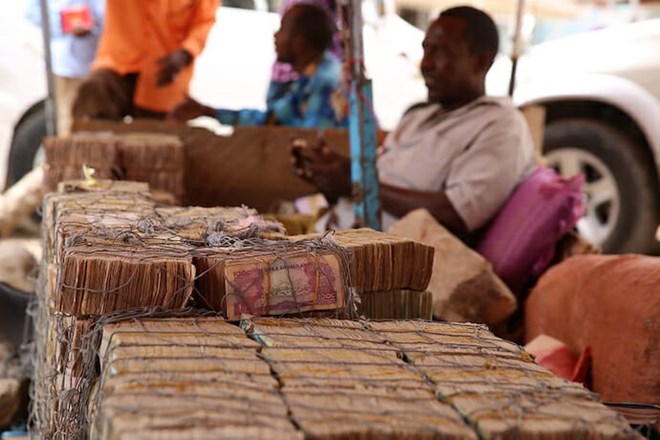
Money market in Hargeisa, Somaliland. (Fiona Graham/WorldRemit)
After the Ethiopian government scaled down diplomatic relations with Hargeisa in favor of Mogadishu, the president of Somaliland hosted an Egyptian delegation to discuss trade and investments in July 2020. The parties reportedly discussed the leasing of an Egyptian military base as well. The visit alarmed Addis Ababa. An Egyptian presence in a neighboring country would represent a strategic threat to Ethiopia. That was sufficient to convince Abiy Ahmed to send a delegation to re-establish full diplomatic relations that month. In September, another delegation of top security officials landed in Hargeisa to discuss further cooperation and, possibly, the creation of an Ethiopian naval base in place of the Egyptian. Addis Ababa has probably averted the threat of an Egyptian base on its doorstep for the time being. However, it will be increasingly difficult to balance the alliance with Mogadishu and Somaliland’s new posture.
Exploiting Disputes
Besides the Nile dam dispute, Somaliland’s authorities have shown shrewdness in exploiting regional and international divisions to advance their position abroad. Another case is the recent dispute between Kenya and Somalia. The diplomatic spat mainly revolves around the maritime border, relevant for the adjudication of oil and gas offshore fields, and Kenya’s support to the Somali border state of Jubaland, currently hostile to Mogadishu.
In mid-December, President Bihi visited Kenya and was received by President Uhuru Kenyatta as a normal head of state. During the bilateral meeting, the two presidents agreed to open a consulate in Hargeisa, set up direct flights, and launch cooperation initiatives in agriculture, livestock, energy, as well as between the ports of Mombasa and Berbera. In response, the Mogadishu government severed diplomatic ties with Nairobi, signaling its readiness to do the same with any other country which builds relations with Somaliland.
But the most surprising step taken this summer by President Bihi was recognizing Taiwan. On July 1, Taiwan’s foreign affairs minister made public the deal between Somaliland and Taiwan. Under the arrangement, both administrations agreed to open representative offices and foster cooperation across various sectors. China swiftly reacted by sending its ambassador to Somalia, Qin Jian, to Hargeisa. According to reports, the Chinese delegations made a series of concessions, including substantial infrastructure investment packages and the opening of a representative office. Nonetheless, President Muse Bihi Abdi declined the offer, receiving China’s harsh criticism and veiled threats.
Somaliland is the first African entity to so openly defy Beijing and the “One-China policy.” As an unrecognized entity, Somaliland cannot issue debt bonds on international markets. Therefore, it does not depend on China for debt financing like other African states, especially neighboring Djibouti and Ethiopia. China’s intensive fishing off Somaliland’s coast (authorized by Mogadishu only) was a relevant reason for attrition, but other factors entered the calculus. Djibouti is becoming the pivot of China’s penetration in the Horn of Africa and this might lead the U.S. to move out of Djibouti someday while keeping a military base close to Bab el-Mandab. The deal with Taiwan received an important endorsement from Washington. And against this background, Somaliland is showing its suitability as a geopolitical partner for the United States.
Another cleavage has recently (re)emerged: Somalia’s constitutional crisis. The impasse turned into a crisis on February 8, when the mandate of the Somali parliament and President Mohamed Abdullahi Farmaajo, largely known as “Farmaajo,” expired without an agreement on the next elections between the Federal Government and Somali Member States. Among the issues on the table, there is the designation of delegates for Somaliland, who should vote for parliament and president in the elections and could prove decisive in the re-election (or the defeat) of President Farmaajo. Hargeisa has no say in the appointment of these delegates and is not directly involved in the confrontation. Yet, the isolation and distraction of Mogadishu’s government play into the hands of Somaliland that is expanding its diplomatic outreach across Africa, and has recently welcomed delegations from Malawi and Zambia to discuss bilateral cooperation.
Somaliland’s brinkmanship strategy risks further destabilizing an already turbulent region. Like other states in the Horn of Africa, Hargeisa exploited the divide between the UAE-Saudi Arabia and Qatar-Turkey axes, obtaining a fruitful partnership with the former. Yet President Bihi also openly distanced Somaliland from China and anchored it in the American sphere. This decision is unprecedented in the Horn of Africa since all other countries have, to some extent, opened their doors to China given Washington’s gradual retreat from the region.
This strategy is fraught with dangers. First, China is present economically and militarily in the Gulf of Aden, as well as in all Somaliland’s neighbors, whereas the U.S. is not expected to double down its engagement in the region. This leaves plenty of room for retaliation to Beijing. Furthermore, Hargeisa complicates its relations with its allies since both the UAE and Ethiopia enjoy strong partnerships with China. Ethiopia, in particular, will have to compete for influence in Somaliland with its most bitter enemy, Egypt, while maintaining strong ties with Djibouti and Somalia at the same time. In addition to the China-Somaliland rift, the UAE will have to manage the growing tensions between Somaliland and the Somali state of Puntland, another Emirati ally in Somalia. Puntland and Somaliland have long clashed over the areas of Sanaag and Sool and a recent uptick of violence shows that the situation continues to deteriorate unabated.
In brief, Somaliland’s new diplomacy risks deepening polarisation around the U.S.-China competition and intensifying hostilities between regional actors in the Horn of Africa.
Somalia’s international partners issue joint-statement
Somalia’s international partners issue joint-statement




Source: Hiiraan Online, Tuesday April 6, 2021
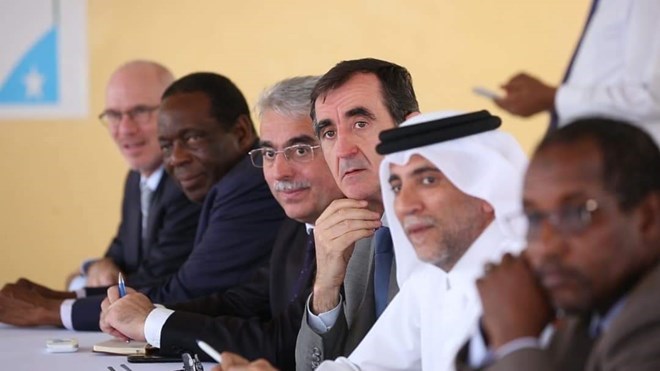
Mogadishu (HOL) – A host of international partners have issued a joint statement appealing to Somali leaders to resolve the electoral crisis ahead of the Holy month of Ramadan.
“Noting the importance of the planned FGS-FMS summit, international partners urge that this Somali-led and Somali-owned dialogue lead to the resolution of all outstanding issues and permit implementation of the September 17 electoral process. Such an agreement, symbolizing unity, compassion, and care for others, would demonstrate leadership and concern for the Somali nation and offer a special Ramadan gift to the people of Somalia.The letter appeals to the Muslim sentiment of the leaders.
“As Somalis prepare to welcome the Holy Month of Ramadan, international partners express hope that the basic tenets of reflection, tolerance, forgiveness and reconciliation will usher in a successful summit of the Federal Government and Federal Member State leaders.”
Somalia’s international partners have been working for months to bring the Federal Member States and the Federal Government of Somalia to the negotiating table. They have grown vocal in recent weeks and have raised their concerns in several press releases. Despite the international efforts to broker a compromise, a deal is still not yet on the horizon.
“We urge FGS and FMS leaders to use this opportunity to resolve their differences and make the necessary compromises in order to ensure that credible, timely, and peaceful elections can be held without further delay to allow Somalia to move forward.”
The letter was signed by representatives from the African Union Mission in Somalia (AMISOM), Belgium, Canada, China, Denmark, Djibouti, Ethiopia, European Union (EU), Finland, France, Germany, Intergovernmental Authority on Development (IGAD), Ireland, Italy, Japan League of Arab States (LAS), Netherlands, Norway, Organisation of Islamic Cooperation (OIC) Russia, Qatar, Sudan, Sweden, Switzerland, Turkey, Uganda, United Kingdom, United States, and the United Nations.
Somalia fell into a constitutional crisis after its federal mandate expired on February 8 without an agreement to hold parliamentary and presidential elections.
Eritrea’s Goals in the Red Sea Basin
Eritrea’s Goals in the Red Sea Basin
Source: The International Crisis Group posted on 6 April 2021 a 45-minute podcast titled “What Eritrea Wants” with Alan Boswell and Harry Verhoeven, a scholar on international politics in Africa.
Following the political transition in Ethiopia and Eritrea’s alliances with Gulf states across the Red Sea, Asmara is looking to shape the region in its favor. According to Verhoeven, Eritrean President Isaias believes the current conflict in Tigray Region is creating new political and security imbalances in the Horn of Africa that open the door to even more conflict. Isaias is a realist who primarily acts to protect what he has built in Eritrea.0 commentsLabels: Abiy Ahmed, Amhara nationalism, border conflict, Eritrea, Ethiopia, IGAD, Isaias Afewerki, Meles Zenawi, Qatar, Red Sea, Saudi Arabia, Somalia, Sudan, TPLF, UAE, US, Yemen
Is Ethiopia Stuck in a Guerrilla War in Tigray Region?
Is Ethiopia Stuck in a Guerrilla War in Tigray Region?
Source: The Guardian published on 4 April 2021 an article titled “Ethiopia Is Fighting ‘Difficult and Tiresome’ Guerrilla War in Tigray, Says PM” by Jason Burke.
After declaring a couple of months ago a decisive victory in Ethiopia’s “police action” in Tigray Region, Prime Minister Abiy Ahmed has now acknowledged Ethiopian central government forces are engaged in a guerrilla war that is “difficult and tiresome.”
Comment: The outcome may well depend on how long Eritrean forces are willing to commit significant numbers of troops to the conflict in support of the Ethiopian National Defense Forces and whether they can maintain morale in a foreign war.0 commentsLabels: Abiy Ahmed, Amhara militia, atrocities, Eritrea, Ethiopia, guerrilla war, Tigray Region, Tigrayan Defense Forces, TPLF
Kenya’s Plan to Close Two Camps Worries Refugees
Kenya’s Plan to Close Two Camps Worries Refugees




Source: VOA, By Harun Maruf, Khadar Hared
Saturday April 3, 2021
A mother and daughter walk at the Kakuma refugee camp in northern Kenya, March 5, 2018.
The Kenya Interior Ministry’s announcement last week of its intention to close two major camps has increased uncertainty for hundreds of thousands of refugees, leaving many of them distraught.
“I am not ready to be repatriated to Somalia,” fretted Muslima Abdullahi, an 80-year-old woman living in Hagadera, part of the Dadaab refugee complex in northeastern Kenya. “I have nine orphaned children here,” she added. Years ago, terrified by insecurity, she left her homeland and she’s wary of returning now. “My house has been taken. I have no property or livestock. I don’t have a job ahead of me. I am not ready for the process” of repatriation.
Ready or not, Kenya’s government says she and other refugees will have no choice but to leave the country. On March 24, Interior Minister Fred Matiangi announced Kenya had given the U.N. Refugee Agency 14 days to present a plan to close Dadaab and Kakuma camps.
There would be “no room for further negotiations,” Matiangi’s official Twitter account said.
CS @FredMatiangi issues UNHCR with 14 day ultimatum to have road map on definite closure of Dadaab and Kakuma refugee camps. Says no room for further negotiations. pic.twitter.com/8z3yLMjzgD— Ministry of Interior (@InteriorKE) March 24, 2021
Dadaab and Kakuma camps, both located in northern Kenya, together shelter more than 410,000 refugees and asylum-seekers. More than half of their population come from Somalia and roughly a quarter from South Sudan. The rest come from the Democratic Republic of Congo, Ethiopia, Sudan and elsewhere in the region.
Abdullahi Osman Haji was among the first refugees to arrive at Dadaab nearly 30 years ago, driven from Somalia by civil war. He married in the camp and has been raising 12 children there. He longs for Somalia but considers that unrealistic, given its fragile government and the ongoing threat of al-Shabab terrorist attacks.

Kakuma and Dadaab camps, Kenya
“Closing the camps will have [an] adverse impact on us,” Haji said of refugees.
The United Nations High Commission for Refugees (UNHCR) shares that concern. It issued a statement last week saying the decision would affect “the protection of refugees in Kenya, including in the context of the ongoing COVID-19 pandemic.”
The UNHCR said it was ready to support Kenya’s government in strengthening ongoing efforts “to find solutions that are orderly, sustainable and respect refugee rights.”
Kenya’s announcement came without explanation about why it seeks the camps’ closures now. VOA made repeated but unsuccessful attempts to get a comment from Kenyan officials.
The Nairobi government in 2016 had called for shuttering Dadaab, after intelligence reports indicated two major al-Shabab attacks in 2013 and 2015 had involved participants from within the camp, but no evidence linking the camps with al-Shabab has been publicly released. Kenya’s High Court ruled in early 2017 that closing the camp would be unconstitutional.
Somalia’s ambassador to Kenya, Mohamud Ahmed Nur, accuses Kenya of politicizing refugee affairs. He contends Kenya’s ultimatum on the camps “is because of the maritime dispute.”
That border disagreement, festering for years, is over control of a 100,000-square-kilometer stretch of the Indian Ocean, which contains an abundance of fish in its waters and possible oil and gas deposits below. The case went before The Hague-based International Court of Justice (ICJ) in mid-March, though Kenya refused to attend the weeklong hearing. The ICJ, the United Nations’ highest court, could take months to reach a decision.
Aden Barre Duale, a lawmaker and former majority leader in Kenya’s National Assembly as well as an ethnic Somali, thinks the maritime dispute may have been a factor in his government’s call for the camp closing. But he doesn’t support the measure.
“This case is not legal, not implementable,” Duale said.
He represents the northeast Kenyan area in which Dadaab is located. His constituents and “their leaders, religious leaders … do not have any problems with the Somali community.”
Financial strain
Both Dadaab and Kakuma camps opened in the 1990s, offering UNHCR-administered havens to people fleeing civil wars and strife in Somalia and Sudan. Another wave of Somalis arrived in Kenya in 2011, driven from their homeland by drought and swelling their numbers to nearly half-a-million. The number of refugees in Dadaab declined to the current figure of 230,000 after a 2013 agreement among Kenya, Somalia and the UNHCR supporting refugees returning voluntarily to Somalia.
UNHCR refugee programs in Kenya and elsewhere are feeling the strain of insufficient funding, Glenn Jusnes, a spokesperson for UNHCR Kenya, told VOA in an email response.
“The COVID-19 pandemic has exacerbated the already dire humanitarian needs globally – particularly in the low and middle-income countries that are currently hosting more than 85% of the world’s refugees,” he wrote.
The related economic slowdown has hurt. In the 2020 calendar year, UNHCR Kenya received $94 million – some $70 million less than it had sought, Jusnes said. For 2021, it had received approximately $33 million as of March 9, leaving a funding gap of more than $116 million.
Globally, the UNHCR’s 2020 budget was over $9.1 billion but it received some $5.2 billion, leaving a 43% funding gap, Jusnes said. He noted that underfunding cuts into the UNHCR’s protection, assistance and resilience activities.
In Kenya, infrastructure and road improvement projects in the Kakuma refugee camp and the nearby Kalobeyei settlement were suspended in early 2020. “Poor road conditions … have complicated access and assistance to refugees,” and “significant amounts” of money have gone to vehicle repairs instead of to direct aid to refugees and host communities, Jusnes said.
Little choice
While Kenya wants to close the camps, residents of Dadaab and Kakuma say they have no safe alternatives.
Shamsa Mohamed Aden was among the refugees who voluntarily returned in 2017 to Kismayo, her southeastern Somali hometown. But she and her household, including four children, “couldn’t get the essentials of life, such as education and clean water.”
They recently returned to Hagadera, a camp in the Dadaab refugee complex, and Aden is reluctant to go back. She said of herself, “All Shamsa can do is to wait for UNHCR’s help again.”
This report originated in VOA’s Somali Service. Harun Maruf reported from Washington; and stringers Abdiaziz Barrow and Khadar Hared contributed from Mogadishu and Nairobi, respectively. Abdiweli Mohamed Ali contributed reporting from Dadaab refugee camp.

